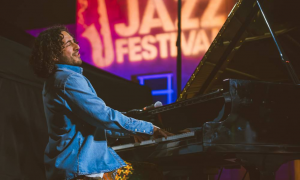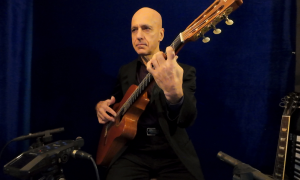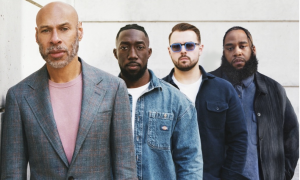[The following post was written by Robin Millar, a guitarist, record producer, and musician mentor whose productions have sold over 55 million copies. It is an expanded version of a comment he made on U2 manager Paul McGuinness's recent article for British GQ, “How to Save the Music Industry"]
I first organised a public meeting to highlight the rise of digital music and the Internet at George Martin's Air Studios in London in 1991. At that conference I stated that over the counter sales would become less important than digital listening within 15 years.
Now we are where we are and people who create music find themselves at war with consumers who are used to free music. The solutions proposed by French Presidents, the music industry giants and many artists is prohibition, prosecution and policing. This puts us up as fascists and the creative commons and other freedom fighters gain support from politicians and the public against us. Who can blame them?
But the freedom fighters say filesharing should be free and copyright is bunk.
However, one thing that none of the proposed solutions on either side address is to me one of the great values of the Net, the do-it-yourself market place—the democratisation of music making without the need for an intermediary record company or streaming service.
The perception of who owns the music out there on the net is completely inaccurate. Figures showing that 95% of music is shared illegally are not based on reality.
The last IFPI figures show there are over 55 million pieces of music up on the internet at present. The best collection society databases, or Itunes or anyone else have only 7 to 8 million of these tracks registered...those tracks owned by music companies and registered with the world's collection societies like PPL, PRS, ASCAP or BMI. The remaining 47 million tracks are created and owned by individuals, often at home, often alone. . They can't get record deals. They may not want to get record deals. They want their music heard....and they would like to make a bit of money if their music becomes really popular and widely shared. We must accept and protect these new ways of being creative.
ISPs have made enormous gains over the last few years directly due to the needs of consumers to traffic in music and film, currently reflected in a £250bn+ global business while the music industry now and the film industry around the next corner shrink and decline.
My solution is simple: the technology is already in place to track all internet traffic and identify creative content by audio and video fingerprinting right down to individual users. The ISPs need to come to an agreement with rightsholders to pay an annual multi-million pound fee to a collection society and with that society, send information about all the creative content sent outside of bundles, streaming services and online shops on a per user and per use basis.
The ISP charges each consumer a monthly sum depending on the amount of bandwidth they use. The traffic which has been identified is put into a database, matched with the relevant content and a payment triggered—and the more a track is trafficked the bigger the piece of the pie it earns. this is exactly what happens with radio and TV play—performance income. All radio and TV companies pay an annual sum for a license to play whatever they like. Every track played on a station is logged and the info is sent to the collection societies who hold the data about who played, wrote, produced and owns that track. The more a track is played the more it earns. Audio fingerprinting technology can identify any piece of music within seconds. Fingerprinting is already starting to replace the old playlists sent by radio stations to collection societies.
But for this system to be the solution all 55 million tracks must be on the database. What must now happen is that each and every person who puts their creative content on the net must be able to register this content simply with the central collection societies around the world. Otherwise only that content owned by corporations will share in the cake.
In 2008 the late Mark Smith and I designed and perfected a piece of freeware called YourTrak, a simple programme for anyone to upload their tracks and the information about who played on it, wrote it, sang on it and owned it, along with an audio fingerprint, to be fed directly to the collection societies' databases. For the past two years I have tried to encourage collection societies to take up YourTrak to widen their databases to include the DIY market but I have had no support. This may be because these societies are owned by the major companies or controlled by major publishers and successful writers but I think it is more likely to be a lack of understanding that people who create in a small village in Africa have as much right to share in the revenue as U2 or Sade.
I have also demonstrated how simple this programme is to Apple, Avid, Last FM and all the other companies who you would have thought would wish to champion the rights of the individual and protect and enfranchise them. They express support but will not take the step of putting the software out with their music workstation software. I think they are more concerned with continuing to build relationships with Universal, Google, Sky TV and others on subscription models and streaming services offering the top 8 million tracks. Neither these corporations nor the collection societies think that the little people who might earn £20 matter.
Subscriptions and monthly bundles of well-prepared and well-delivered content are absolutely fine and Sky TV has shown that people will pay a great deal for choice and ease of use.
But if ISP's paid 10% of their revenues per annum for the unlimited license of their subscribers to freely exchange files and this money was divided into millions of micropayments—then we have a future. Until registration becomes ubiquitous the inherent unfairness will continue. I see no future in control, prohibition, lawsuits and so on. Charge ISPs a fee and then let their consumers do whatever they like.
Robin Millar CBE Hon Patron Music Producers Guild Music Patron UNHCR
I first organised a public meeting to highlight the rise of digital music and the Internet at George Martin's Air Studios in London in 1991. At that conference I stated that over the counter sales would become less important than digital listening within 15 years.
Now we are where we are and people who create music find themselves at war with consumers who are used to free music. The solutions proposed by French Presidents, the music industry giants and many artists is prohibition, prosecution and policing. This puts us up as fascists and the creative commons and other freedom fighters gain support from politicians and the public against us. Who can blame them?
But the freedom fighters say filesharing should be free and copyright is bunk.
However, one thing that none of the proposed solutions on either side address is to me one of the great values of the Net, the do-it-yourself market place—the democratisation of music making without the need for an intermediary record company or streaming service.
The perception of who owns the music out there on the net is completely inaccurate. Figures showing that 95% of music is shared illegally are not based on reality.
The last IFPI figures show there are over 55 million pieces of music up on the internet at present. The best collection society databases, or Itunes or anyone else have only 7 to 8 million of these tracks registered...those tracks owned by music companies and registered with the world's collection societies like PPL, PRS, ASCAP or BMI. The remaining 47 million tracks are created and owned by individuals, often at home, often alone. . They can't get record deals. They may not want to get record deals. They want their music heard....and they would like to make a bit of money if their music becomes really popular and widely shared. We must accept and protect these new ways of being creative.
ISPs have made enormous gains over the last few years directly due to the needs of consumers to traffic in music and film, currently reflected in a £250bn+ global business while the music industry now and the film industry around the next corner shrink and decline.
My solution is simple: the technology is already in place to track all internet traffic and identify creative content by audio and video fingerprinting right down to individual users. The ISPs need to come to an agreement with rightsholders to pay an annual multi-million pound fee to a collection society and with that society, send information about all the creative content sent outside of bundles, streaming services and online shops on a per user and per use basis.
The ISP charges each consumer a monthly sum depending on the amount of bandwidth they use. The traffic which has been identified is put into a database, matched with the relevant content and a payment triggered—and the more a track is trafficked the bigger the piece of the pie it earns. this is exactly what happens with radio and TV play—performance income. All radio and TV companies pay an annual sum for a license to play whatever they like. Every track played on a station is logged and the info is sent to the collection societies who hold the data about who played, wrote, produced and owns that track. The more a track is played the more it earns. Audio fingerprinting technology can identify any piece of music within seconds. Fingerprinting is already starting to replace the old playlists sent by radio stations to collection societies.
But for this system to be the solution all 55 million tracks must be on the database. What must now happen is that each and every person who puts their creative content on the net must be able to register this content simply with the central collection societies around the world. Otherwise only that content owned by corporations will share in the cake.
In 2008 the late Mark Smith and I designed and perfected a piece of freeware called YourTrak, a simple programme for anyone to upload their tracks and the information about who played on it, wrote it, sang on it and owned it, along with an audio fingerprint, to be fed directly to the collection societies' databases. For the past two years I have tried to encourage collection societies to take up YourTrak to widen their databases to include the DIY market but I have had no support. This may be because these societies are owned by the major companies or controlled by major publishers and successful writers but I think it is more likely to be a lack of understanding that people who create in a small village in Africa have as much right to share in the revenue as U2 or Sade.
I have also demonstrated how simple this programme is to Apple, Avid, Last FM and all the other companies who you would have thought would wish to champion the rights of the individual and protect and enfranchise them. They express support but will not take the step of putting the software out with their music workstation software. I think they are more concerned with continuing to build relationships with Universal, Google, Sky TV and others on subscription models and streaming services offering the top 8 million tracks. Neither these corporations nor the collection societies think that the little people who might earn £20 matter.
Subscriptions and monthly bundles of well-prepared and well-delivered content are absolutely fine and Sky TV has shown that people will pay a great deal for choice and ease of use.
But if ISP's paid 10% of their revenues per annum for the unlimited license of their subscribers to freely exchange files and this money was divided into millions of micropayments—then we have a future. Until registration becomes ubiquitous the inherent unfairness will continue. I see no future in control, prohibition, lawsuits and so on. Charge ISPs a fee and then let their consumers do whatever they like.
Robin Millar CBE Hon Patron Music Producers Guild Music Patron UNHCR




















